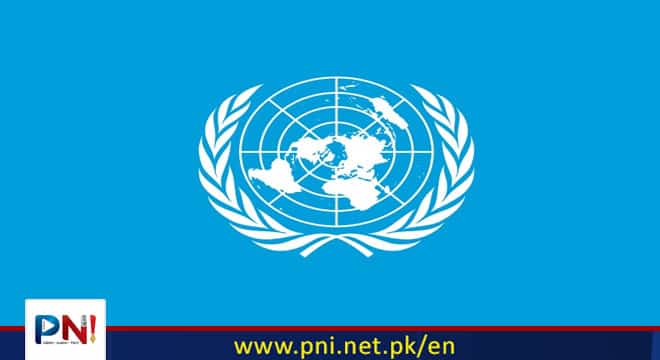UNITED NATIONS, Jan 09 (APP):: With no let-up in Israeli bombardments across Gaza, the UN health agency pleaded on Tuesday for better access across the enclave, where relief is arriving “too little, too late” to help civilians caught up in the ongoing conflict. “Even if there is no ceasefire, you would expect humanitarian corridors to operate… in a much more sustained way than what’s happening now,” Dr Rik Peeperkorn, the UN World Health Organization (WHO) Representative for the Occupied Palestinian Territory, said in a statement. “It’s too little. It’s too late and specifically in the north.”
Humanitarian assistance and particularly food – is desperately needed across Gaza, particularly in northern areas, confirmed WHO Emergency Medical Teams Coordinator Sean Casey. “The food situation in the north is absolutely horrific, there’s almost no food available,” he told journalists in Geneva via video from Rafah in southern Gaza. “Everybody we talk to begs for food and comes up and asks, Where, where’s the food? People help us get our medical supplies through.
But they are constantly telling us that we need to come back with food.” Echoing that appeal and expressing concerns about intensifying hostilities in the south, Dr Peeperkorn explained that moving staff and supplies “safely and swiftly” had been compromised, “as deconfliction is required for any moves across Gaza, including the south – often leading to delays”. In addition to getting more essential supplies into Gaza, what was also needed urgently was easier movement of humanitarian aid and workers within the enclave, “so that we can reach people wherever they are,” Dr Peeperkorn explained. According to Gaza’s Ministry of Health, 23,084 people have been killed in the enclave, 70 per cent were women and children. Nearly 59,000 people have also been injured, which is approximately 2.7 per cent of Gaza’s population.
The WHO official insisted that the UN and its partners remained “completely ready” to deliver assistance to Gazans, who have endured a massive bombing campaign by the Israel military. But hostilities and evacuation orders in Gaza’s central areas and further south in Khan Younis have affected access to hospitals for patients and ambulances, Dr Peeperkorn explained, adding that it has also become “incredibly complex” for WHO to reach “ailing” facilities with medical supplies and fuel. Of concern are three hospitals located near evacuation zones – European Gaza Hospital, Nasser Medical Complex and Al-Aqsa – “lifeline” in the south for about two million people, the WHO official said, speaking from Jerusalem. “(The) constricted flow of supplies and access and evacuation of medical staff from many hospitals due to fears for safety are a recipe for disaster and will make more hospitals non-functional, as witnessed in the north. The international community must not allow this to happen,” Dr Peeperkorn said. One indication of the “shrinking space” for lifesaving humanitarian work in the enclave is the fact that the UN health agency has not reached northern Gaza for two weeks. A total of six planned WHO humanitarian missions have had to be cancelled since 26 December, according to the UN health agency. “Our team is ready to deliver but we have not been able to receive the necessary permissions to proceed safely,” Dr Peeperkorn added.
Follow the PNI Facebook page for the latest news and updates.









